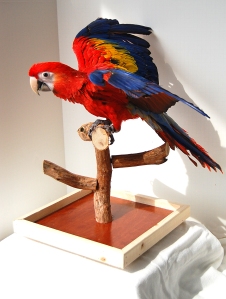In the bird world, the arrival of Spring means one thing: it’s breeding season! For bird owners this can be a difficult time of year. The most important advice we can give you is this: be patient. This is a difficult time for your birds; their hormones are changing in preparation for breeding and it will affect their bodies. Because of this, they may be irritable. They may scream, they may bite, or they may become more destructive than usual, but be patient. This does not last forever and it is not their fault. It will get better. So, let’s look at what can be done to make this time easier for everyone.
A pair of Hyacinth Macaws
Firstly, egg-laying hens are going to need extra calcium to replace what their bodies use during egg production. This can be given in the form of cuttlebone or mineral blocks, but the best and most natural way is to simply offer them hard-boiled egg with the shell. This can be mashed up and given in a separate bowl for them to forage through. Because the egg is moist, powdered supplements will stick to it and can be offered as well. Many companies make several varieties of vitamins — some for moulting, some for breeding, etc. These are incredibly convenient and highly beneficial, but be sure to read the labels as more potent formulas should not be given every day. It is also a good idea to consult your avian veterinarian before giving vitamin supplements as each bird is different and some may not require the extra vitamins.



A pair of Hyacinth Macaws
Firstly, egg-laying hens are going to need extra calcium to replace what their bodies use during egg production. This can be given in the form of cuttlebone or mineral blocks, but the best and most natural way is to simply offer them hard-boiled egg with the shell. This can be mashed up and given in a separate bowl for them to forage through. Because the egg is moist, powdered supplements will stick to it and can be offered as well. Many companies make several varieties of vitamins — some for moulting, some for breeding, etc. These are incredibly convenient and highly beneficial, but be sure to read the labels as more potent formulas should not be given every day. It is also a good idea to consult your avian veterinarian before giving vitamin supplements as each bird is different and some may not require the extra vitamins.

Nekton Vitamins
Vitamin and mineral supplements are helpful, but they cannot take the place of a healthy diet with fresh foods. Ensuring that your birds are getting plenty of fruits, veggies, whole grains, and healthy seeds is especiallyimportant during this time of year. It will help with moulting, and also helps to prevent bad behaviors as parrots will be occupied with foraging. Make sure you’re offering a wide variety of fresh foods as often as you can.

Fresh fruits and vegetables are essential
Sleep schedules are important during the breeding season as well. Too much or too little sleep can impact your bird’s health and mood, and, subsequently, their behavior. Make sure your bird has a dark, quiet place to sleep at night where he can feel secure. Birds should only get 10-12 hours of daylight; any more than that and it stimulates the natural urge to breed, as the days are longer during the breeding season.
During the daylight hours, allow your parrot to spend some time in direct sunlight. Sunlight is crucial to vitamin D production and indirect light is not sufficient. The body produces vitamin D only when it is in contact with direct sunlight. The absorption of calcium is also affected by sunlight, so it may be a waste to give your parrots fancy supplements if they are not spending any time outdoors. (Their bodies may be unable to efficiently utilize the vitamins and minerals contained within the supplements without the aid of sunlight.) Studies have also shown that sunlight can have an effect on mood. Spending time outdoors can help to elevate your mood, and the same may be true for your parrots.
The breeding season also means frequent rains, so avoid bathing your parrots too often. However, do not make the mistake of avoiding bathing altogether. Birds that don’t have access to showers or bathing bowls can accumulate quite a build-up of dust or dander and oils. In extreme cases, the discomfort caused by this can lead to feather plucking as parrots will try to rid themselves of the dust and oils. In less-severe cases, however, it will just lead to a cranky bird. If your parrot is moulting, bathing can help to expedite the process. And, bathing is refreshing! Just like dogs, birds often feel happy and playful after they get a bath. So, to reiterate: do not make bathing a daily activity as it may stimulate breeding, but DO give your birds a bath every week or so. It will help to keep them happy and healthy.

An Amazon Parrot takes a shower in the rain
Everything discussed here should be incorporated into regular care of birds. Unfortunately, we humans often become overwhelmed with our own lives and, understandably, sometimes neglect the basics of bird care. Make an effort to go back to the basics this breeding season. Don’t neglect the simple things such as sunlight and vitamins. Make sure your parrots are getting enough sleep – cover their cages if your household has light for more than 12 hours a day. These little things can make a big difference in your bird’s quality of life and they will also help you in the long run because your parrots will be happier, healthier, and more even-tempered, making them less likely to engage in bad behaviors.


No comments:
Post a Comment